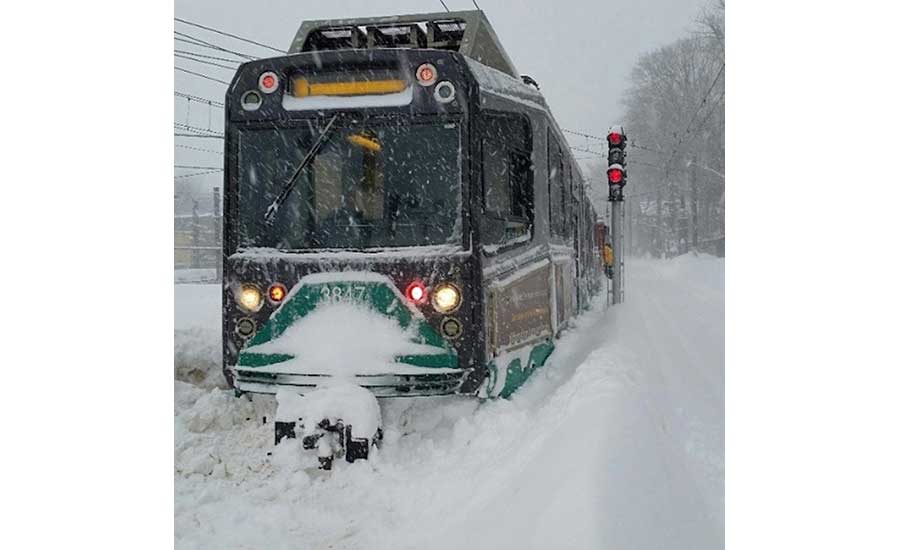In an address before the Greater Boston Chamber of Commerce, Massachusetts Gov. Charlie Baker (R) announced the state is seeking a new general manager for the Massachusetts Department of Transportation who can lead capital projects such as the Green Line Extension.
The new general manager will replace chief administrator Brian Shortsleeve, who will continue serving as acting general manager in the interim, Baker said in a Feb. 16 statement. Baker also recommended that the MBTA’s Fiscal and Management Control Board (FMCB) exercise the two-year extension of its governance of the MBTA, as permitted by law.
“The MBTA is showing real progress in its turnaround, from vastly improved winter operations to cutting its operating deficit by more than half, but more work is needed to deliver better and more efficient results to riders and taxpayers,” Baker stated.
Massachusetts Department of Transportation (MassDOT) Secretary Stephanie Pollack, who is charged with hiring the MBTA’s general manager, has created a search advisory panel, and is securing an executive search firm to identify a CEO-style general manager. The manager’s “primary focus will be to continue the work of changing the MBTA’s culture to focus on performance, capital investment and improved customer service,” she said.
These new developments bode well for advancing the $2.3 billion Green Line Extension project that plans to extend the MBTA Green Line from a relocated Lechmere Station in East Cambridge to Union Square in Somerville and College Avenue in Medford on two distinct lines and involve construction of seven new stations. The project, beset with troubles, was suspended after a review in late 2015 found the project had ballooned significantly over budget. That led to the FMCB suspending the project, firing the contractors, and redesigning it to contain costs. In a Jan. 23 CommonWealth article, John Dalton, the project manager hired in November, said the project will go out for bids in May.
A Jan. 31, filing with the state Executive Office of Energy and Environmental Affairs states that the newly designed project remains in the same corridor and will still have seven stations at the same locations, but they are considerably smaller and have fewer amenities with shelters instead of canopies that were in the earlier, more elaborate designs, the filing notes.
Meanwhile the MBTA is working closely with the Federal Transit Administration as the funding process moves forward in coming weeks and months, says MBTA Spokesman Joe Pesaturo. On Jan. 25-26, the MBTA met with the FTA for a risk workshop, “a required step in the process of examining the redesign of the project and its revised budget,” he said.
The Boston Globe reported on Jan. 24 that Baker said the project was on a priority infrastructure list that the Trump Administration had recently circulated.
Noteworthy: MBTA Winter resiliency work following severe winter storms that halted the T for three days in February 2015 has progressed. The second phase of the $18.5 million MBTA Red Line winter resiliency work awarded in July was completed in December, Pesaturo said. That work was awarded in July to Barletta Heavy Division, Boston, and implemented upgrades along 9.9 miles of the Red Line’s Braintree and Ashmont Lines, including the replacement of all third rail and heating systems, track and tie renewals, signals, track structure and conduit installations.
Phase I, the $83 million MBTA Winter Resiliency Plan announced by the Baker-Polito Administration in 2015, focused on infrastructure, equipment, and operations improvements on the Red Line and Orange Line to mitigate the magnitude of system disruptions during severe weather, Pesaturo said.
The plan’s first phase, implemented last year, included third rail and rail heater improvements along 13.6 miles of the Red Line from the Andrew Station portal to Quincy Adams, he said. The second phase, which began last summer and was scheduled for completion in December, completes improvements along the entire length of the Red Line. Investments have also been made to secure specialized snow removal equipment to increase snow removal capacity and ensure passenger vehicles operate on schedule, Shortsleeve said.
The MBTA commuter-rail system finished in 2016 with an on-time performance rate of 89 percent, the agency's commuter-rail operator Keolis Commuter Services announced in a Jan. 25 statement. When adjusted for delay factors beyond the company's control, on-time performance was nearly 94 percent for the year, Keolis officials said. That compares to an average on-time performance of only 33% in 2014, according to a February article in Progressive Railroading.
Station work
On the Framingham/Worchester Commuter Rail Line west of Boston, Skanska is lead contractor for the $24 million Boston Landing at Allston/Brighton Station, according to the MBTA. An additional $10 million in track and signal improvements associated with the station is also underway. All work is on schedule and the station is scheduled to open in late spring, said an MBTA spokeswoman. The new station, that will serve as a transit hub, is expected to benefit from 60 acres of new space opened up by the $260 million Mass Turnpike straightening project scheduled to begin later this year.
On Jan. 25, the MBTA Fiscal Management and Control Board approved a $17 million contract with McCourt Construction for construction of the Blue Hill Avenue Station in the Mattapan section of Boston. It will be the ninth station for the 9-mile Fairmount Commuter Rail Line.


Post a comment to this article
Report Abusive Comment